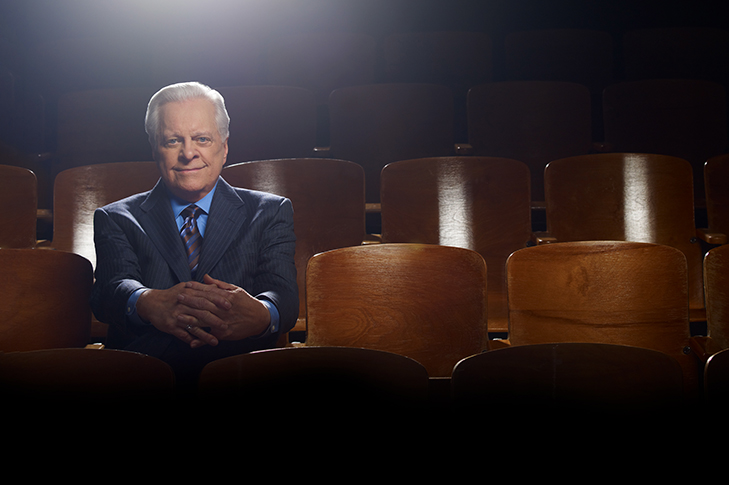HOLLYWOOD—Since its launch in 1994, two factors defined TCM: classic movies and its equally classic host, Robert Osborne.
For 23 years, until illness sidelined him, Osborne served as the cable channel’s animating force and genial ambassador. So when he died on March 6, “the outpouring of emotion was overwhelming,” said Ben Mankiewicz, fellow TCM host. “His death felt like an earthquake. He was the face, the heart and the soul of TCM.”
At this year’s TCM Classic Film Festival, which was dedicated to Osborne’s memory, Mankiewicz and other TCM staffers paid tribute to their late friend and colleague at a panel discussion titled “Remembering Robert.” Throughout the 90-minute session, staffers emphasized the importance of preserving his legacy. “Robert Osborne loved the festival, especially because it gave him a chance to engage with fans and talent,” said Jennifer Dorian, TCM general manager. “We want to carry on his work at TCM.”
When it came to interacting with fans, “Robert never said no to anything,” said Sean Cameron, vice president of studio production for TCM. “He was always so generous with his time.”
“He treated us like movie stars,” said Jennifer Riedle of Chicago, who attended the festival with her sister Maureen, and addressed the crowd when the session was opened to audience questions. “He truly is irreplaceable. When we heard about his death, we cried as much as we did as when our mom died.”
Osborne’s connection to TCM fans was “unprecedented,” said Mankiewicz, who attributed that quality to his co-host’s sincere and genuine nature. “What you saw on the air was Robert,” he said. “He always had an air of authenticity. He proved that the best way to connect is through building a sense of authenticity.

Though Osborne would interview stars such as Kim Novak, Peter O’Toole and Luise Rainer on his “Private Screenings” and “Live from the TCM Classic Film Festival” segments, he occupied the same rarified plane. “Robert was like Mick Jagger,” said Mankiewicz, referring to the Rolling Stones’ legendary front man. “He was a rock star, while I played Bill Wyman or Charlie Watts.”
But unlike those bad boys of rock, Osborne was “always such a gentleman,” said Gary Freedman, a director and senior producer at TCM, who was Osborne’s longtime producer. Osborne believed in following an old-school code: “He would insist on guys wearing suits for dinner,” Freedman said. “He always treated everyone, especially women, with respect.”
Actress Diane Baker, whose friendship with Osborne began during the early ’60s when she testing at 20th Century Fox, said, “He was just a nice guy, the guy next door. He was always so kind and caring.”
But this quintessential gentleman and nice guy was no pushover. “To his credit, he didn’t interfere with programming choices,” said Charlie Tabesh, senior vice president of programming and production for TCM. “He might send a gently worded email, in a nice way. But that was rare.”
Cameron recalled one exception, TCM’s Drive-In Summer Film Festival, which featured beach movies and exploitation fare: “He loathed those kind of movies.”
Behind the scenes, Osborne was involved in shaping his introductions and his other TCM segments. “If it came out of his mouth, he had a part in it,” Mankiewicz said. “That’s because of his background as a writer,” said Tabesh, referring to Osborne’s work as a columnist for the Hollywood Reporter and as the author of several books.
Above all, Osborne championed the artists of Hollywood. “There was a humanity to him,” said Darcy Hettrich, who recently retired from her post as vice president of talent at TCM. “At the time when TCM was launched, a lot of older stars were ignored.” But through his stewardship, Osborne helped to bring them back into the limelight. “These stars responded to that kind of respect,” Hettrich said. “He cared so much for these people and wanted them to be treated with respect.”

Over the years, Osborne nurtured personal ties to Hollywood royalty. “He would call Bette Davis and also Olivia de Havilland every Sunday on the phone,” Hettrich said. Meanwhile, he refused to traffic in gossip, and always tried to stress the positive. For instance, Osborne “would not talk to Esther Williams for a year after her memoir [in which she claimed Jeff Chandler was a cross-dresser] came out.”
Several TCM staffers spoke reverentially about Osborne’s work as a mentor—and ultimately, as a role model. “He saw something in me,” Freedman said. “The best advice he ever gave me was ‘grow where your seed is planted.’ No one taught me more about films, art and culture—and also how to die with dignity. It’s like he produced the story of his life until the very end.”
Baker added: “He wanted to be in charge of his life, in every aspect.”
When she visited him in January, Baker realized that “it was going to be the last time that I would see him. He told me, ‘No sad songs for me. Everything that I could have ever imagined has happened. I’ve had a wonderful life.’”
Baker and Mankiewicz urged the crowd to keep Osborne’s memory alive by sharing stories of his influence on TCM, and of his longtime support for film preservation and appreciation. “You’re going to watch these movies, and you’re going to think of him,” Mankiewicz said.
“The work he did for 23 years left us more ready to face the future. Thanks to Robert, TCM is now the preeminent force in classic film. There’s no replacing him, but then, there’s no stopping TCM.”











